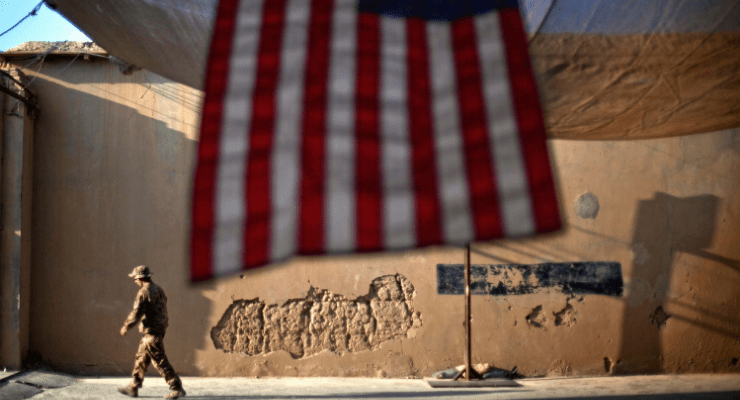
At the start of May, the United States began the final withdrawal of its armed forces from Afghanistan. Scheduled for completion by the 20th anniversary of the 9/11 attacks, this retreat will end the longest war in American history.
Overlapping with the parallel conflict in Iraq as part of George W Bush’s “War on Terror”, these twin invasions inflicted hundreds of thousands of casualties, mostly civilian. Millions more were displaced. The cost to US taxpayers was $6.5 trillion. That’s enough to buy every American household a sports car. Few would argue it was money well spent.
However even before the last boots have left the ground, warmongers are beating their drums again. Some have set their sights on Iran. Others spy a bigger fish in China. North Korea is another perennial bogeyman. In the minds of these armchair warriors, America must always have an enemy.
Sixty years ago America’s greatest 20th century general, Dwight Eisenhower, warned in his farewell presidential address of the danger posed by the military-industrial complex. Having been “compelled to create a permanent armaments industry of vast proportions”, he foresaw the impetus that could immerse the United States in forever wars.
What drives this behemoth? Follow the money. The United States spends $730 billion per year on defence, more than the next 10 countries combined. This is half of all federal government discretionary spending. After mandatory commitments to health care and Social Security, everything else the government funds — education, transport, housing, energy and more — splits the other half.
In the land of the free market, military spending is a massive jobs program. 2.2 million active and reserve personnel serve in uniform. Millions more work in civilian roles and for contractors supplying weapons, technology, food, transport, logistics, and allied services. The pork is spread across every state, ensuring bipartisan political and business support.
It’s not that the hawks all want war without end, or that they live in constant fear. It’s more cynical than that. To them, enemies are good for business.
Has this cash drain made America safer? From available evidence, the answer must be no. Certainly a conventional military attack on American soil by another country is all but inconceivable. But cyber warfare by other governments and independent hackers has caused havoc in American democracy, and held tens of thousands of businesses and individuals to ransom. Government and corporate computer systems have been repeatedly breached, exposing sensitive data to hostile actors. Just last week an Eastern European criminal gang called DarkSide crippled a critical oil pipeline, causing fuel shortages and surging gas prices.
Meanwhile a shambolic response to the COVID-19 pandemic has killed more Americans than every war in the last 150 years combined. Latin American neighbours remain riven by poverty and corruption, contributing to crime and refugee migration. And climate change, identified as an “existential threat” by the Pentagon in a secret report as far back as 2004, is still dismissed as a hoax by conservative leaders and their followers.
The solution to these perils cannot be more of the same.
In 2009 eight former secretaries of state, both Republicans and Democrats, published a letter calling for more American diplomats. They noted that hard power must be buttressed by soft power to advance America’s national interests. They urged the federal government to rebalance the scales and invest more dollars in diplomacy. Their call went unheeded.
Instead under Donald Trump the State Department, America’s diplomatic crown jewel, was eviscerated while already bloated military expenditures were inflated by more than $100 billion annually. This increase was double American’s entire yearly investment in diplomacy and foreign aid.
Despite this splurge, Trump left America’s national security worse than he found it. With his systematic degrading of the global legal and diplomatic architecture, his routine insults and tantrums aimed at America’s closest allies, his toadying to authoritarian dictators, and his dismissal of any news or intelligence reports that conflicted with his own desires, he sowed instability and chaos around the world. America First left America alone.
Imagine how that spare $100 billion each year might have been spent instead to bolster American and international security. The United States could have built schools, hospitals, roads, and bridges in developing nations. It could have employed teachers and doctors to educate the next generation, and improve the health and wellbeing of populations around the world. It could have invested in agriculture to feed the hungry. It could have enhanced law and order with training and legal resources. It could have installed internet infrastructure to plug poor countries into the global economy.
This would be nothing new. In fact the United States has engaged in these activities for decades. All wealthy nations do likewise. They do so not simply due to benevolence, but out of enlightened self-interest. Fostering human development and economic growth improves stability and security for all nations. It also provides political and economic influence to the donors, and creates new markets to export their goods and services. Since much foreign aid is tied to such exports, it boosts donor economies too. Just like the military-industrial complex, American soft power also creates American jobs. Schools and hospitals also generate more goodwill than bombs and bullets.
China understands this. That’s why in addition to modernising its military forces, it has embarked upon its signature Belt and Road Initiative. Launched in 2013, this multi-trillion dollar modern Silk Road will build transport, energy, and communications infrastructure in more than 100 countries by 2050. It will reshape the global economic, political and security order.
The existing system was built by the United States out of the ruins of World War II, and strengthened during four decades of Cold War. The Marshall Plan helped rebuild a devastated Europe. The United Nations was created to promote resolution of international disputes. The Bretton Woods Conference established a monetary and financial framework to spur economic recovery and growth. The World Trade Organization was founded to facilitate and regulate global trade. These institutions helped create more prosperity, and lift more people out of poverty, than ever before.
They are proof that soft power, judiciously applied, more than pays for itself. America used to understand this. For its own sake, and the rest of the world, it must do so again. Today’s challenges are too complex and interconnected for any single country to resolve by itself. Cooperation is critical to success. If America does not lead, then China will.
The Biden administration recognises this urgency. In his speech to Congress, President Biden stressed that “America will not back away from our commitments to human rights and our fundamental freedom and our alliances”.
The United States rejoined the Paris Climate Accord on Biden’s first day in office, and he has since hosted a summit of world leaders to make fresh progress on tackling climate change. Vice-President Harris has been tasked to address Central American instability by targeting the root causes. The administration also plans to help vaccinate the world against COVID-19. In its first budget the administration will seek an immediate boost to State and USAID funding.
As a more recent general James Mattis, Trump’s first secretary of defense, bluntly stated: “If you don’t fund the State Department fully, then I need to buy more ammunition.” Fewer guns and more butter is the key to America’s future security. Fortunately Joe Biden is in lockstep with this perspective.








The US military serves many purposes – another one is keeping the undereducated and children of the underclass off the streets and off the dole. Think of it as enhanced work for the dole.
With the very real possibility of death, injury and PTSD as bonuses.
It’s just sad.
The same thinking that jails more people than any other country on earth perpetuates the need for more force to obliterate people that are different. It is inbuilt into conservative thinking. Punishment and agression are hallmarks of right wing conservative thinking everywhere including here in Oz.
The school yard bully is followed by its little mate Aussie Yap Yap Yap